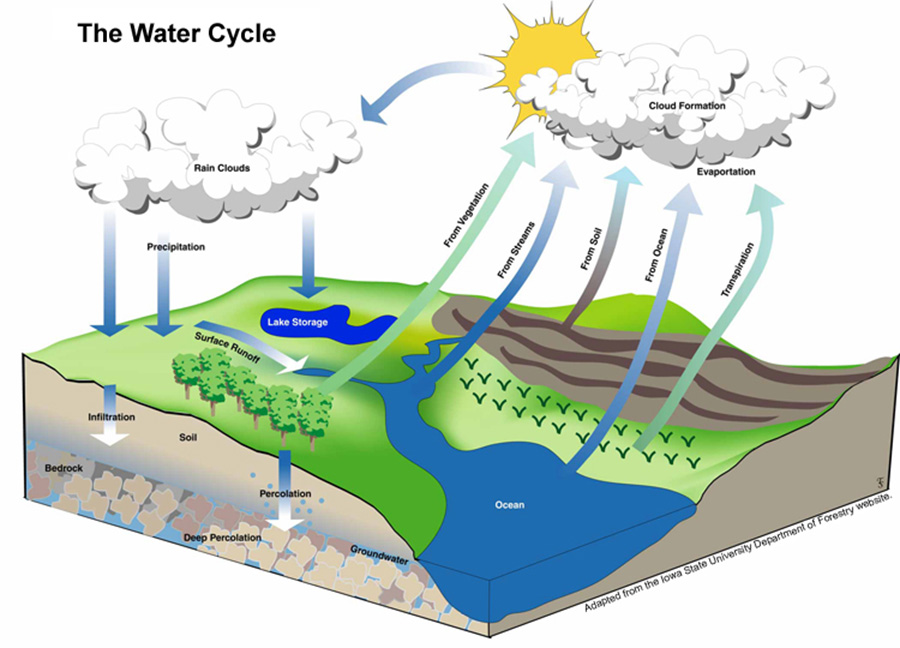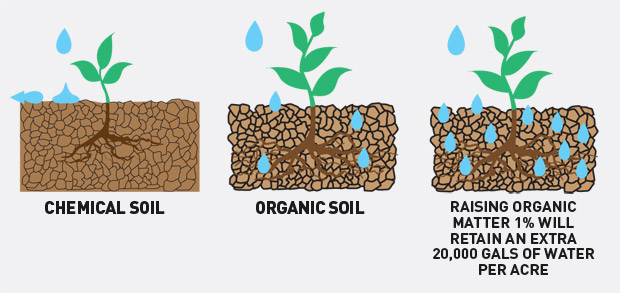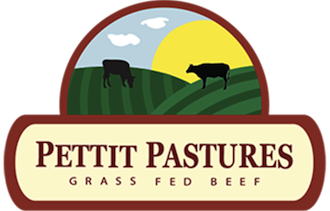How The Water Cycle Affects Our Weather
We often talk about how through managed rotational grazing Pettit Pastures is improving soil health and the water cycle on our farm. In this article we go into more detail on how improved soil health and a functional water cycle are intertwined.
Back in grade school, most of us learned about the water cycle. Rain falls to the ground, where the soil absorbs it like a sponge. That fresh water hydrates the carbon-based lifeforms on earth. But through evaporation, and transpiration from plants leaf surfaces, it gets back into the atmosphere to feed clouds for the next rainfall.

The cycling of liquid water and returning vapor creates our climate and our living environment. And that’s what mankind has broken over time.
Thousands of years of tilling soil and overgrazing pastures has led to the desertification (land turning into desert) of over half of the world’s land areas. Uncovered soils bake in the sun, making them impervious to water penetration. The majority of rain that falls on these baked soils doesn’t soak in, instead it runs off creating erosion problems and carrying pollutants into our lakes, streams, and rivers.
Prior to agriculture, there were very few desert areas on earth, where “desert” is defined as “large tracts of bare soil”. There were plenty of low rainfall areas, but prior to man’s influence, nature kept them covered with growing foliage of some kind that allowed the soil to absorb water and support life. Even in the United States where large scale agricultural has only been practiced for hundreds of years instead of thousands of years, we are seeing areas of desertification.
Dry soils short circuit the evaporation and transpiration stages of the water cycle. Without ongoing evaporation and transpiration, rainfall diminishes and deserts are gradually increase, changing the climate worldwide.
On top of that, the world’s expanding population lives primarily and ever-increasingly in cities. There, rain falls on buildings, pavement and low cut lawns. Rather than being absorbed into the landscape, runoff is directed into streams and rivers, to be lost to the oceans.
Part of the global climate solution lies in focusing efforts on managing rainwater so that it is absorbed where it falls. That involves improving the organic matter of soils and keeping soils covered with natural mulches and actively growing plants of all types. We need to grow food using cover crops, no-till planting methods, and managed rotational grazing that promotes vibrant pastures.
If we manage the water cycle and nurture life in our soils, mankind can successfully live in the modern world. It’s a matter of working WITH nature rather than trying to dominate it. We simply need much more “green” and much less “brown” in the world.

Now you may be thinking “ that is great farmers should do things to improve our climate, but I am not a farmer. What can I do?” Well the truth is that You as a consumer have a whole lot of power. Farmers will produce more of what there is a demand for and less of what there isn’t a demand for. Every time you purchase food you create that demand. If you choose food that was raised in ways that improve the soils and benefit the environment you are creating more demand for those products.
Pettit Pastures realizes that buying from local farmers is not always the most convenient for the consumer. Convenience can be the deciding factor in your food purchases. That is why we offer sales of individual cuts of beef for sale, as well as 1/4s, 1/2s, and whole beef. We also offer free delivery to the Twin Cities, St. Cloud, and most of central Minnesota.

